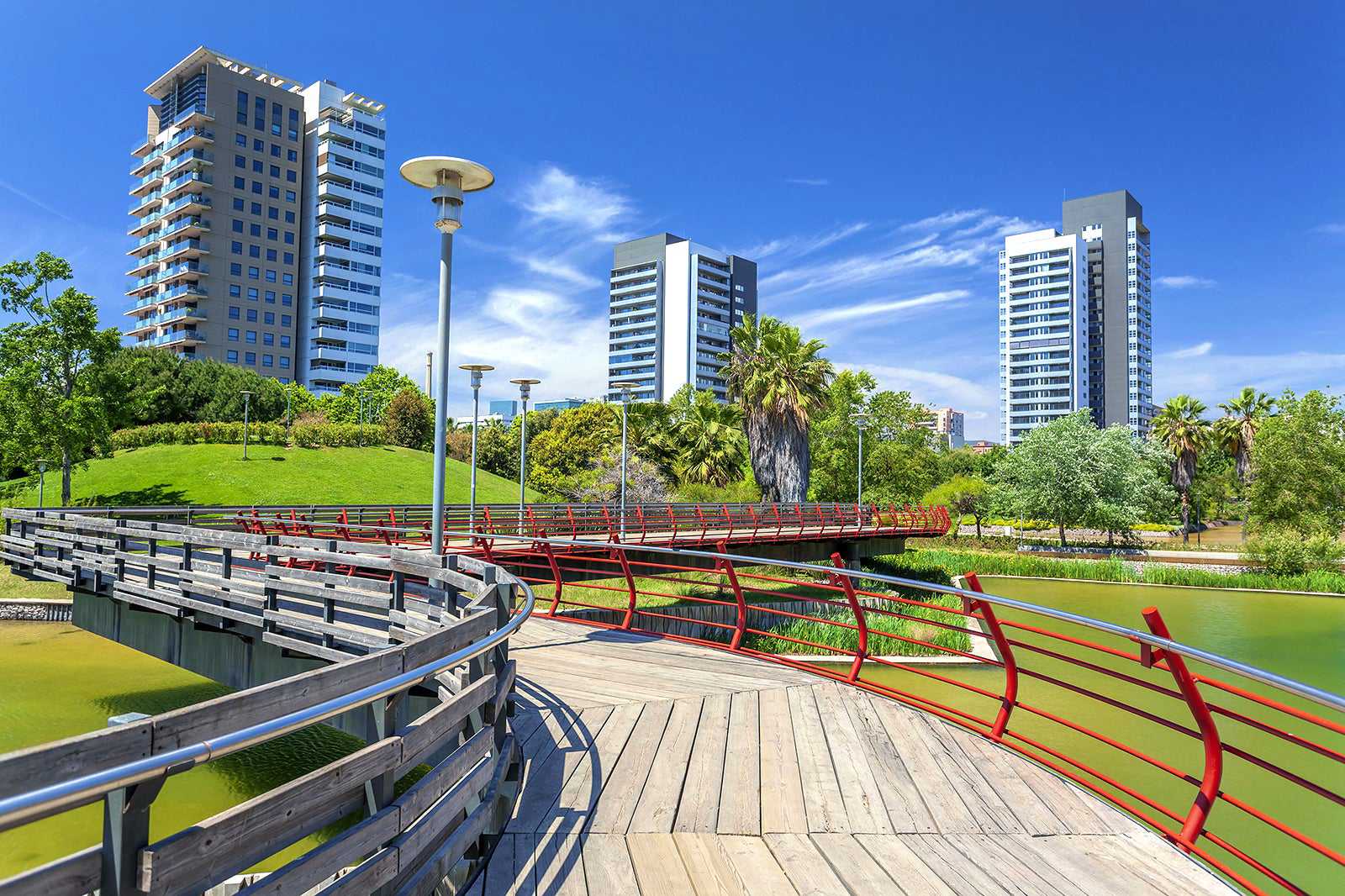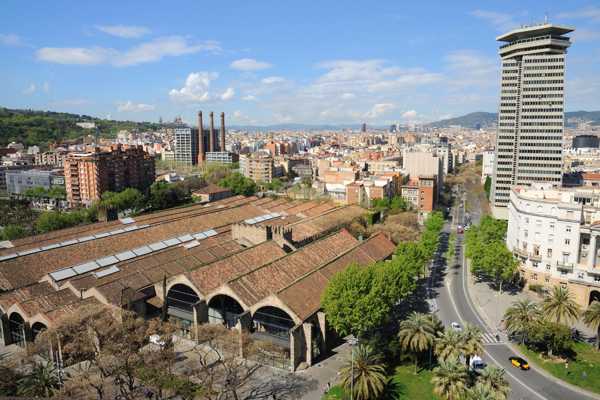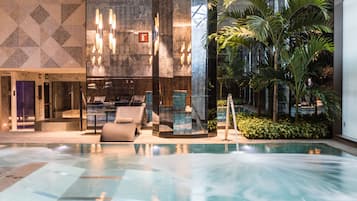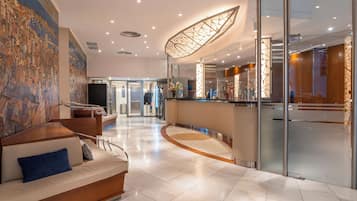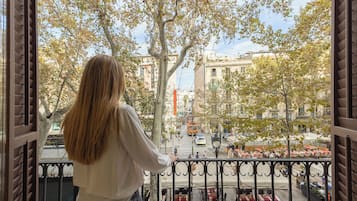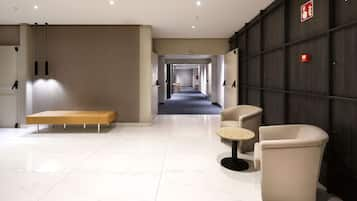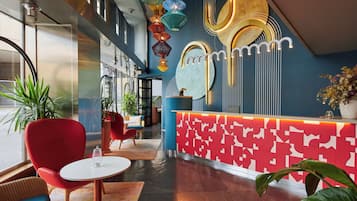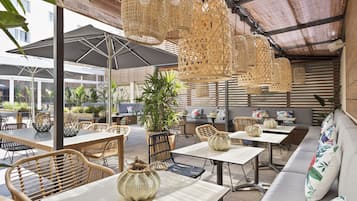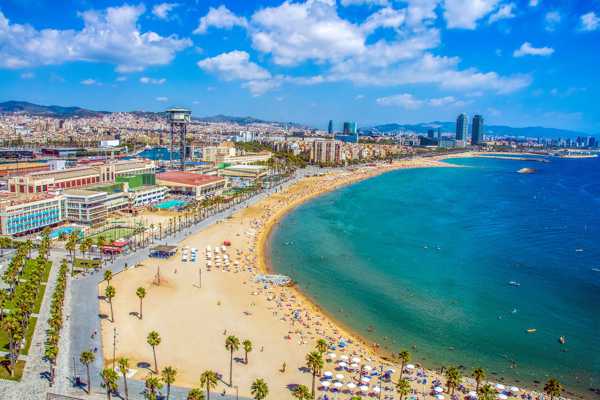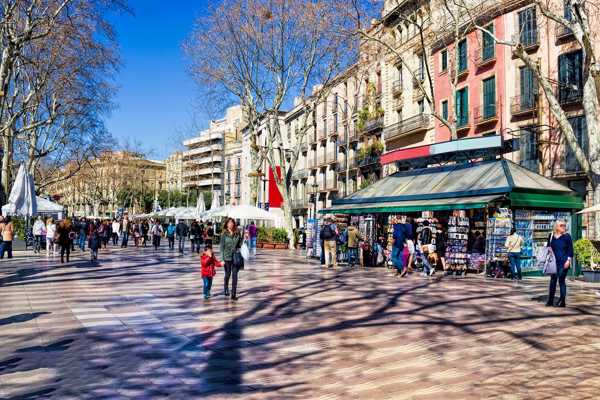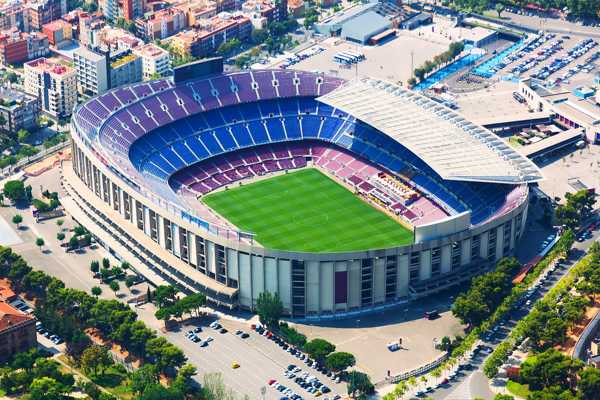The most popular neighbourhoods in Barcelona range from some of the oldest areas in the city to coastal districts with beautiful beaches a stroll away. Each Barcelona neighbourhood offers a different highlight for your trip. The Catalonian capital is full of history and modern culture, with Gaudi's architecture providing the backdrop to many of the region's most popular sights.
Whether you're looking for a quiet retreat hidden among some ancient Roman columns or a more modern-themed getaway next to the awe-inspiring Camp Nou football stadium, our guide shows you what to enjoy and where to stay in Barcelona for your next trip.
- 1
Diagonal Mar
Modern Seaside Shopping
- Couples
- Familles
- Gastronomie
- Photographie
- Shopping
Afficher plus d’infosDiagonal Mar is a seaside neighbourhood known for its gastropubs, shopping opportunities and beach area, and it's where Barcelona’s longest street reaches the Mediterranean. A former industrial area, the district was transformed into an urban wonderland full of luxury hotels, top-rate apartments, residential towers, architectural parks, business centres, a massive mall and a brimming beach.
Diagonal Mar commonly hosts conferences and music festivals, such as Primavera Sound, and additional events throughout the year. As a mostly upscale residential that appeals to families, you won't find large tourist crowds here, so it's easy to relax in the quiet and enjoy the beautiful horizons over the neighbourhood's parks and shores.
Emplacement : Barcelona, Spain
Carte - 2
Gothic Quarter
A historic locale with local restaurants, shops and cafés
Afficher plus d’infosBarcelona's Gothic Quarter (Barri Gòtic) is the oldest area in the city. It's the heart of the Old Town (Ciutat Vella) and is relatively easy to find, spanning the area from Las Ramblas to Via Laietana. The Gothic Quarter is home to a network of winding, pedestrianised cobbled streets lined with vintage artisan shops and tapas restaurants.
You'll find Barcelona's cathedral in the Gothic Quarter, as well as the remains of the original ancient Roman city walls. The Plaça Reial is a lively public square and is lit up by the streetlamps that formed Gaudi's first public project. The Quarter is also home to the oldest restaurant in Catalonia – Can Culleretes.
Carte - 3
La Rambla
Barcelona’s tourist centre
Afficher plus d’infosLa Rambla, Barcelona's thriving tourist hub, is a beautiful tree-lined promenade that runs from the Plaça de Catalunya to Port Vell, the Old Harbour. It's the first stop for many visitors to the city and gives a great first taste of Catalan food and drinks, atmosphere and entertainment.
You can spend hours simply wandering up and down La Rambla, sampling local fruits at the Boqueria Market or watching the acrobatics of street performers. Art is everywhere, even at your feet, with a mosaic designed by Miró forming part of the pavement. You'll find the famous Gran Teatre del Liceu opera house close to the wax museum, and of course cafés and restaurants for refreshments in between.
Carte - 4
Barceloneta
Barcelona’s beach district
Afficher plus d’infosBarceloneta is an old fishing district of Barcelona, located close to Port Vell, with one of the city's most famous beaches sharing the same name. You'll find Barceloneta to the southeast of La Rambla, where local tapas restaurants serve seafood specialities freshly caught from the Mediterranean.
The beach is the closest to the city centre and so is one of the liveliest in Barcelona. Beach sports like volleyball are common, with vendors providing drinks and massages throughout the day. One of the biggest aquariums in Europe is also close by, if you want to immerse yourself in the marine life of the Med.
Carte - 5
El Born
The charm of Barcelona’s Old Town in a more local neighbourhood
Afficher plus d’infosEl Born is a neighbourhood near the Gothic Quarter in Barcelona's Old Town. It has a more Bohemian feel than many of its neighbours. Less tourist-oriented than its Gothic counterpart, El Born is known for its unique scene of artisan and crafts stores.
In El Born, you’ll easily get a sense of local life – some of the best Spanish produce is available at Santa Caterina market and you can try some of Spain's best coffee at family-run cafés such as Café el Magnifico. If you're looking for something to do during the day, check out The Picasso Museum, home to over 4,000 of the late Spanish artist’s works.
Carte - 6
El Raval
Contemporary Catalan art among old multicultural communities
Afficher plus d’infosEl Raval is a district in Barcelona's Old Town and is the multicultural capital of the city. Historically, this neighbourhood has been home to people of various cultures, with large Arabic, Indian and Filipino communities giving rise to some diverse attractions.
Alongside the wide array of restaurants run by the locals is the MACBA: the Museum of Contemporary Art of Barcelona. This museum is a continuation of Barcelona’s long line of artists, showcasing the most celebrated contemporary Catalan artists from the 1940s to the present day. At the end of the day, you can lose yourself in El Raval’s vintage shops or eclectic bars.
Carte - 7
La Ribera
Take a stroll through the Old Quarter’s avenues
Afficher plus d’infosLa Ribera is an area within Barcelona's Old Town that welcomes you with a quieter atmosphere than the more tourist-oriented Gothic Quarter. La Ribera is often spoken of in the same breath as El Born, which actually forms the northern part of La Ribera.
This historic quarter has a quieter and more authentic feel than the nearby Gothic Quarter and is best explored by taking one of the many walking tours in the area. You'll find local handicraft shops selling their wares beside quaint cafés, all nestled in the neighbourhood's charming terraced avenues.
Carte - 8
Gracia
One of Barcelona’s quiet local neighbourhoods
Afficher plus d’infosGracia sits just north of Barcelona city centre and is a more remote neighbourhood, having a bohemian village feel due to it being a separate town until 1897. Although just a 20-minute drive from the city centre, Gracia retains its independent feel and lets you experience Catalonian life as a local.
Gaudi's surreal Park Güell is the major attraction of Gracia, with the independent cinema Cine Verdi and live music bars and theatres providing one-off nights you won’t forget. Enjoy lunch or dinner at one of the many restaurants, and if you're after an authentic Catalan bodega, stop in at Bodega Cal Pep, a wine cellar that has been running since 1919.
Carte - 9
Port Vell
Barcelona’s Old Harbour
Afficher plus d’infosPort Vell (literally meaning “Old Harbour”) is a major part of the city's port and is found past the Columbus monument at the end of La Rambla. You can walk between the 2 districts via a wooden walkway, a hallmark of the area's great regeneration before the 1992 Olympic Games.
The harbour is full of grand vessels from this century and the last, and there’s plenty of things to do just inland as well. Discover local history at the Maritime Museum or appreciate a wider view of the region at the Museum of Catalan History (Museu d'Història de Catalunya). If you’re feeling adventurous, book a boat tour from beneath the Columbus statue.
Carte - 10
Eixample
A modern neighbourhood with plenty of shops and cafés
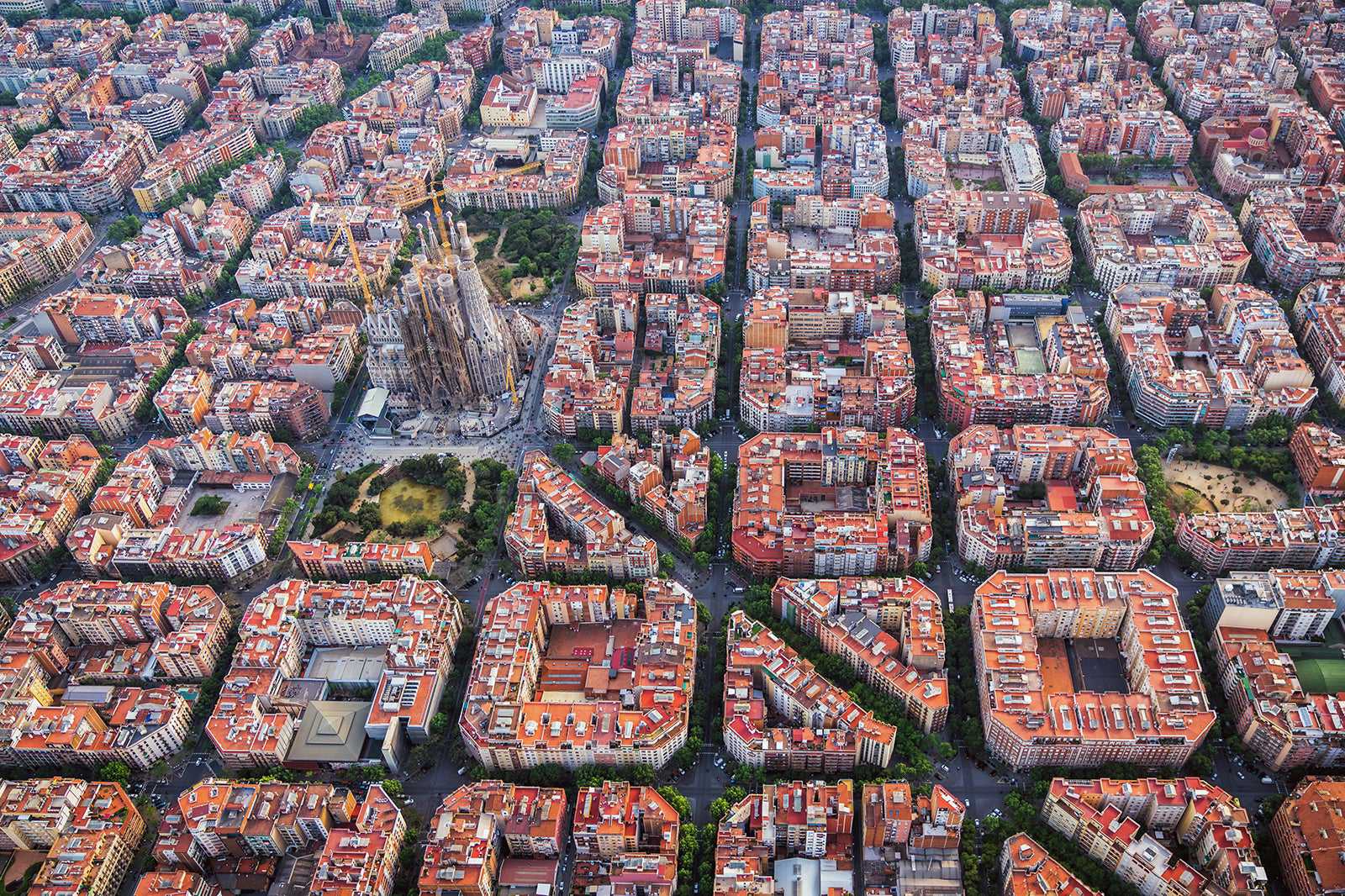
The Eixample represents the modern side of Barcelona, which can be seen from the highly organised grid plan the city was built on in recent times. High-street designer shops and thriving cafés are housed in stunning modern buildings here.
The wide avenues give way to some of Gaudi’s most impressive artistic landmarks. You can find La Sagrada Familia here, the magnificent unfinished church that was built in 1882. Shopping is also big in Eixample, with luxury brands like Chanel and Louis Vuitton found along Passeig de Gràcia. Parallel to this street, you'll find the Rambla de Catalunya, an upmarket boulevard lined with art galleries and restaurants that offer a more refined taste of Spanish cuisine.
Carte - 11
Les Corts
Visit the home of world-famous FC Barcelona
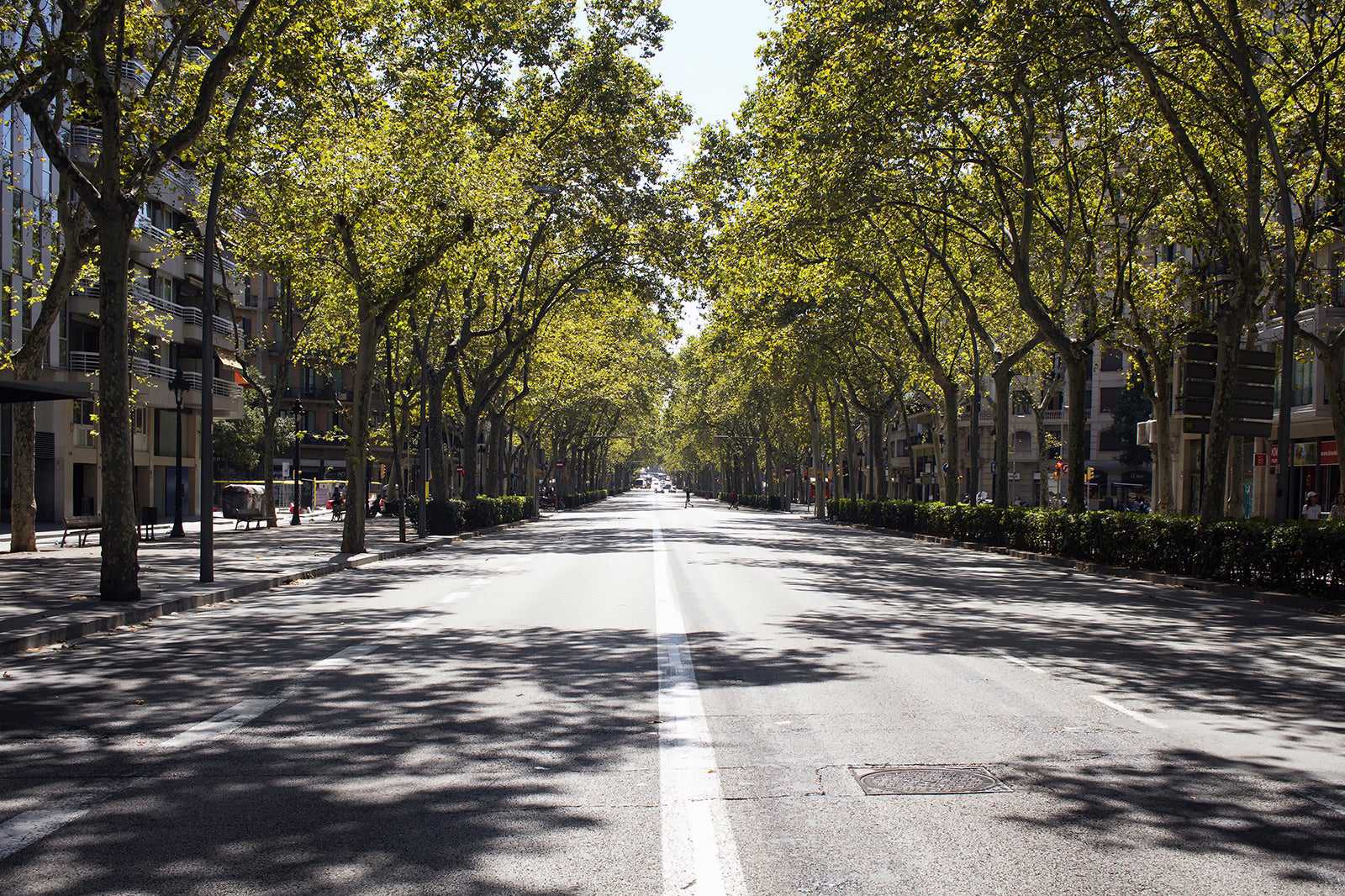
Les Corts is a quiet area of the city that is really famous for one thing: being home to the world-famous football club FC Barcelona. Sitting west of the Eixample, Les Corts is easily accessible from both Plaça del Centro and Les Corts metro stops.
The name 'Les Corts' comes from the original stadium the club used until they moved to the Camp Nou stadium in 1957. Non-football fans can find history at the Monasterio de Pedralbes or relaxation at the Parc de Cervantes, but the real pull of this area is the football stadium and its museum. Discover the history of Cruyff, Ronaldinho, and Messi on the grounds where they played.
Carte

